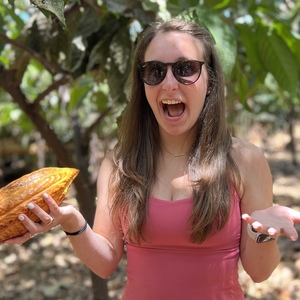Two months ago I moved across the country from Baltimore to attend school at Berkeley. In my first couple weeks here people I met frequently asked me to compare the east and west coast. “What was the biggest culture shock of moving across the country?” My response: Peet’s Coffee. Everywhere I went on campus—Goldie’s, the Den, GBC, even the dining halls—exclusively sold Peet’s coffee.
Initially, I thought the UC Berkeley obsession with Peet’s must be a contractual relationship, similar to the way campus only serves Pepsi instead of Coke. However, it turns out that Peet’s relationship with the area extends way beyond financial agreements. Founded in Berkeley and transformative to the community, Peet’s Coffee is a special place
Peet’s Founding
When Peet’s Coffee’s founder, Alfred Peet, moved to San Francisco in 1955, he was amazed with the “dishwater” Americans served as coffee. Alfred had grown up working at his father’s coffee roastery in Switzerland, and as a young adult skipped college to apprentice at a coffee company in London. He knew quality coffee and immediately saw a desperate need for the coffee culture in the US to change.
Alfred opened Peet’s first location on April 1st, 1966, right here in Berkeley, California on the corner of Walnut and Vine. Within the small working class neighborhood, he wanted to cultivate a business that produced the kind of high quality coffee he was accustomed to from Europe. His business was built on two fundamental principles: darkly roasted coffee, freshly delivered to customers.
Why Dark Roast Coffee?
The way in which coffee beans are roasted has a profound impact on their flavor. When coffee beans reach a certain temperature while roasting, they crack open (similar to popcorn) and release special essential oils. The longer you roast the beans, the more oil coats their exterior. Aside from giving dark roast beans the aesthetic glossiness they’re known for, these oils are important to the coffee’s taste since they introduce complex flavors to the brew. It’s in darker roasted coffee that you will find those delicious creamy and chocolatey flavor undertones.
Fascinated with the interplay of these flavors, Alfred developed his own roasting system making dark roast coffee a Peet’s specialty. Although unaccustomed to its richness, Peet’s customers soon fell in love with the brew’s flavor, putting the business’ name on the map.
Peet’s Impact on Berkeley
Aside from dark roast coffee, Peet’s was also known for valuing freshness above all else. Throughout the business’ development, Alfred worked tirelessly to decrease the distance between coffee bean processing to customer consumption. His passion for fresh ingredients quickly became ingrained within the community defining Berkeley’s food culture. Five years after Peet’s opened its doors, Chez Panisse, early pioneers of the farm-to-table movement, moved in on the same block. Thus started the development of Berkeley’s famous “Gourmet Ghetto”, home to many niche culinary gems today. Peet’s didn’t just change the food landscape within Berkeley—his sentiments on coffee production and freshness spread throughout the country.
How Peet’s Transformed Coffee in the US
Throughout the early 20th century, Americans’ primary source of coffee was brewed from freeze-dried cans of coffee beans. While shelf-stable and easy to use, processed beans diluted the coffee taste, producing sour, watery flavors. Peet’s use of fresh beans exposed Americans to a new range of flavors, revolutionizing coffee consumption in the US.
Furthermore, Alfred built a brand that doesn’t just serve coffee, but values every step in its creation: from growing, to roasting, to brewing the beans. His holistic approach towards coffee brewing not only produced higher quality products, but allowed Peet’s to generate unique hand-crafted blends of coffee. This philosophy gave rise to the gourmet coffee movement welcoming a new age of coffee companies—the most famous of which being Starbucks. Contrary to popular belief, Peet’s Coffee actually predates Starbucks. Alfred Peet mentored the founders of Starbucks coffee and initially supplied their coffee beans when the company opened in 1971!
Walnut and Vine Today
Peet’s original location on Walnut and Vine still looks like your local neighborhood coffee spot. Despite a few modern renovations, the interior is a museum of Peet’s original roasting and brewing machines lining the walls and shelves. The environment inside is friendly, characterized by the rich smell of fresh coffee, and the soft hum of neighborhood locals chatting with one another. At the original oak counter, there are rows upon rows of coffee beans in varying shades of brown. Their names, Viennese Blend, French Roast, Blend 101, are labeled in cursive on worn golden plaques.
After ordering, customers (also referred to as “Peetniks”) are encouraged to write their favorite memories of Mr. Peet or precious moments they’ve had in the shop, in an old leather-bound book. The pages are fittingly stained with blotches of coffee and range from simple messages such as “Thank you, Alfred,” to paragraphs recounting the value of Peet’s presence throughout an individual’s childhood. Beyond bringing quality coffee to the US, Alfred’s most valuable impact is the evident love and camaraderie he inspired within his community
I came to college armed with multiple Starbucks gift cards thinking my biggest concern was whether or not they would last me the semester. Instead, I was met with “Peet’s Coffee”—some random coffee brand I’d only seen packaged as k-cups in select stores on the East Coast. Little did I know, Peet’s Coffee was the “big bang” of American coffee culture, irrevocably changing the culinary landscape of both the local Berkeley community and the US as a whole.
Alas, it appears my days wandering campus caffeine deprived and annoyed by my coffee options are over. Now, I know that a solid cup of coffee is always available to me at Peet’s just around the corner, literally!







